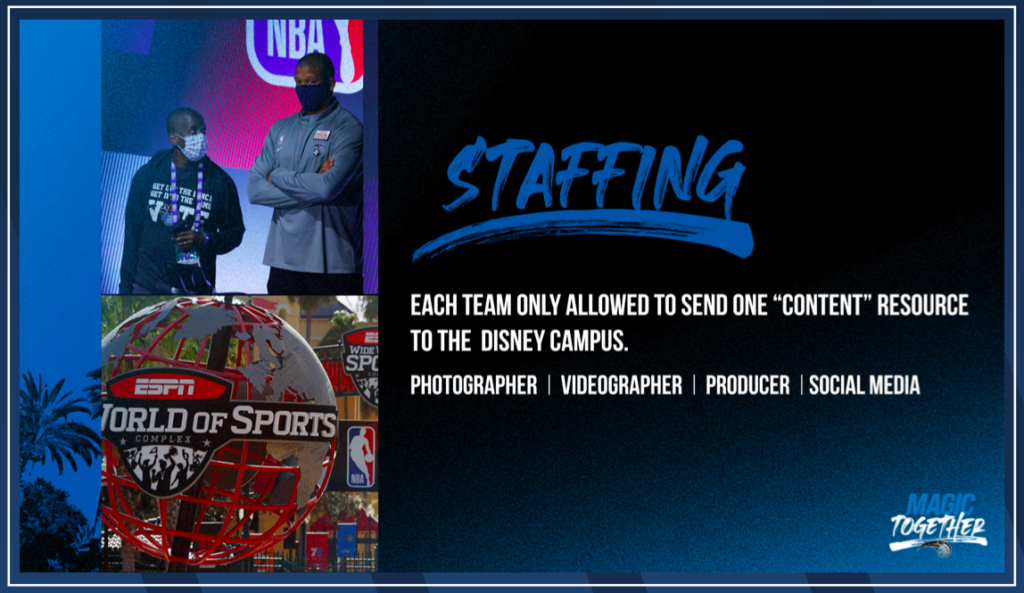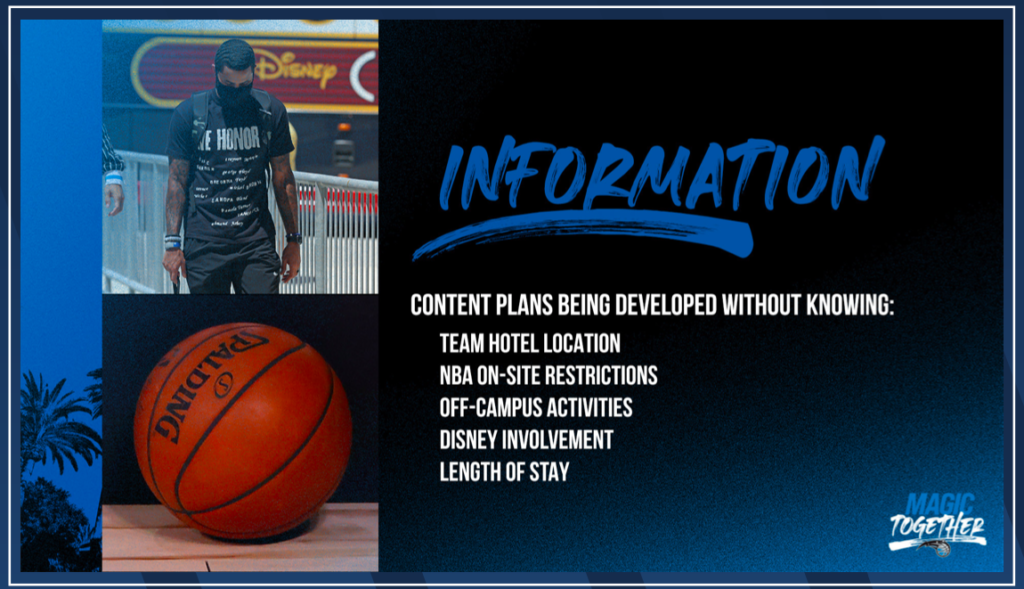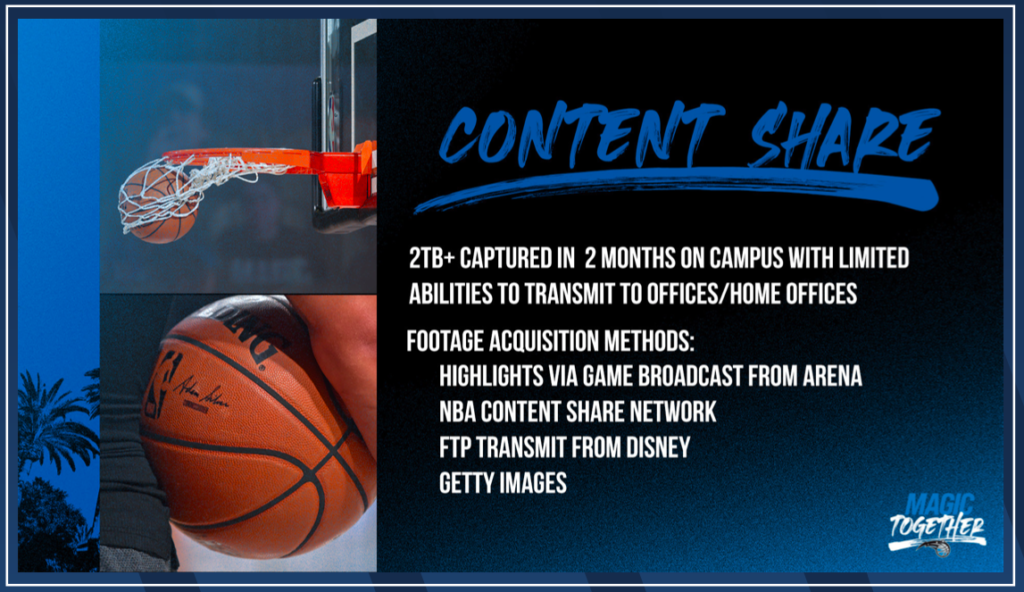During the pandemic, the NBA decided to resume the action by creating the NBA Bubble. A sealed off area within the Disney Park in Florida that was to be home to the teams involved in the play-offs for the next two and a half months. A unique situation that meant that a unique plan was required to make it work.
This week our Key Account Manager, Daniel McLaren, discussed the Bubble and what they learned from being in it with Geoff Krohmer, Head of Live Entertainment & Production at Orlando Magic. Geoff is entering his 15th season with the team and is focussed on both the content studio and social media strategy.
Starting from scratch
When it was announced the NBA bubble was to be held in the Disney Resort in Orlando the planning could then start to take place. But in this unprecedented situation there was a lot that involved unknown scenarios.
When details emerged from the NBA they found out that teams would only be allowed one person within the bubble for content capture. They needed to find someone who could do everything, a one-person content machine with skills in photography, video, production and social media! Fortunately for the Magic they had just the person for the job.

This person stayed with the team, and away from their own home, for 2 1/2 months. Working many hours each day to ensure that everything was captured. Both an exhausting and exhilarating role as they have to be with the team all the time and develop relationships with the players. But is this something that will live on after the bubble?
“Absolutely”! It helped us cultivate our relationship with our players which was something in the past was difficult due to our moderate league results. The key learning is that athletes enjoy having content of themselves. The more comfortable they are the better it is.
But they also needed information from the league to be able to plan what the content was going to be, and how they could best achieve what they wanted. They were developing plans without much of the basic information we take for granted in our roles, for example where the players will be staying or how long they will be there for. Could they capture content with players on their way to the bubble? What tools will they have to be able to do the best job they can?

They knew they had to pivot their content strategy, which is usually planned one to two months in advance. Geoff says that it was difficult to strategize due to that slow flow of information and they also didn’t know if their partnership with Disney, who were hosting the bubble and could potentially give them an avenue to some amazing behind-the-scenes content, would it be something they could utilise.
But despite the partnership, they were unable to go forward due to agreements that were placed between NBA and Disney. A blow when you are trying to find ways in which you can stand out from the other teams who were all in the same situation.
Another challenge was in regard to content sharing. With so much data being captured and then needing to be shared with the team away from the bubble, this presented a huge obstacle, one in which they leaned on the NBA to help them resolve.
“We captured more than 2TB of content in the campus. We originally thought to edit the content and immediately and FTP back to rest of them. But it didn’t go forward because there were a lot of data to transfer every day. So, we lean on the content sources that NBA provide us”
Geoff highlighted that the project management platform of NBA was really useful for his team. It let them know when events were happening within the bubble that they could hook into, as well as giving them access to the NBA archive, entertainment content, photographers and the sports network. All the things that they needed to fill the gaps they had in their content plans.

Making sure the team worked seamlessly together
It was a huge challenge due to the size of the files and the lack of infrastructure. The solution came with some automation for assets that was necessary but also, he unveiled a surprising element.
“Because each NBA team valued a different skillset in content production, there were a lot of discussion and collaboration between Bubble producers which led our producer to improve the quality of the content produced as a team.”
“Content wise the change we saw during the season was that user engagement was mostly related to content off-court till playoffs were close by and engagement shift to basketball content!”
They also used Microsoft Teams to keep everyone in touch and share all the documents, resources, information and content that they used during the Play-Off period.
After Geoff’s main talk we managed to dig into some other aspects of the summer and what else they learnt from such a turbulent year.
Does ‘home advantage’ exist within a bubble?
“Not even close. However, what was interesting was that due to the tagging, the Orlando team had the opportunity jump in various conversations and promote content”
Trying to keep local fans engaged at a time when they couldn’t get close to a court was challenging. They knew that they had to act on a local basis and attempt to bring the court to the fans rather than the other way around.
One way they did this was through interactive competitions and polls within their app, something they’re looking to continue for the upcoming season. Asking questions of the fans to not only keep them engaged with the games but also find out where they were watching, how often they watched and much more. Helping them to learn more about those tuning in than could otherwise have done.
Handling sensitive topics such as BLM and the US election
When the Black Lives Matter movement gained momentum during the summer, it was something the club and league could not ignore. And nor should they. There were no guidelines set in place by the NBA as to what they could and couldn’t say, but it was a huge opportunity to use the platform and highlight the social and racial injustice that was taking place.
It was not about having a specific strategy and doing it for the numbers, it was about passing and amplifying the right message to the people they could reach. As Orlando Magic, they collaborated as an organization to create a unique message and the creation of a website with a lot of resources for educating people about what was happening.
In the lead up to the US election, they concentrated efforts on getting the message out on the importance of voting and making their voice count. This struck the right tone, it’s not the team’s position to say which way to vote, but by staying apolitical they helped encourage one of the largest voter turnouts in US history.
Having a digital focus and engaging international fanbase
As an agency, we’ve been helping the Magic to engage with new audiences in Brazil through their Portuguese language accounts on Instagram, Twitter and Facebook for the last year or so. Geoff talked about how have seen steady growth in Brazil and an expansion into China and Japan as some of the key areas they’ve been seeing when it comes to building up an international fanbase.
Capturing data in a pandemic
As well as the predictive game within the app, a great way in which to gather data and more general information. They also placed a lot of emphasis on social media listening, being able to find out who is talking about the team and when. They could not only find out fan sentiment when it came to performances, which is obvious anyway, they could find out views on the kit the team are wearing, which players they talk about and much more.
This provides them more information that can be turned into insights, helping to define their content strategy and also influence other areas of the business.
It was a great conversation with Geoff, so thanks to him and also to the Orlando Magic for being open to this opportunity to share their story. We look forward to working with them on the upcoming 2020-21 season (and beyond) and hope you find this, and the upcoming video, insightful.
